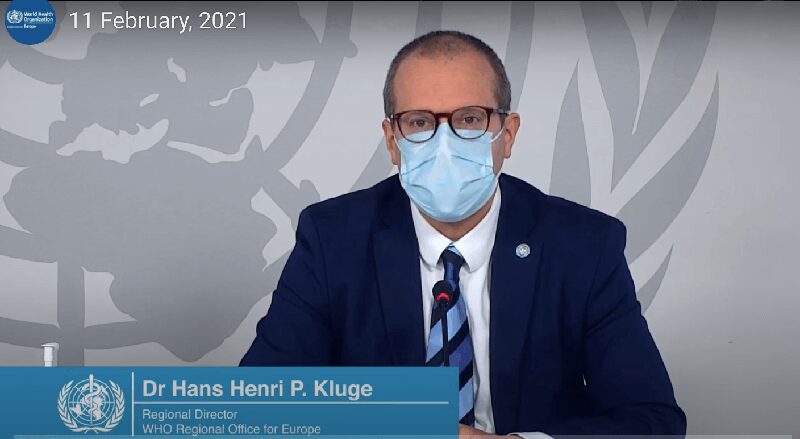FILE PHOTO: European Union flags flutter outside the European Commission headquarters in Brussels, Belgium August 21, 2020. REUTERS/Yves Herman/File Photo/File Photo
BRUSSELS — The European Union is facing a surge in bankruptcies and bad loans once the post-pandemic economic recovery starts to take hold and governments begin withdrawing state schemes that are keeping many firms on life support, a EU document indicates.
The European Commission note, prepared for euro zone finance ministers’ talks on Monday, said that thanks to almost 2.3 trillion euros ($2.8 trillion) in national liquidity support measures, euro zone governments have so far staved off a rise in insolvencies.
Without such help and new loans from banks, almost a quarter of EU companies would have had liquidity problems by the end of 2020 after exhausting their cash buffers because of the economic havoc wreaked by the COVID-19 pandemic, the note said.
“Once the unprecedented public support measures expire, a number of businesses are likely to default on their debt obligations, leading to higher non-performing loans and insolvencies,” said the note, seen by Reuters.
Almost half of all firms that would have had liquidity problems last year because of the pandemic were already at a high risk of default before the crisis, and were now being kept afloat only by government help. They were therefore likely to face solvency concerns after the crisis, the note said.
The ministers’ talks on Monday will focus on how to manage the process of weaning firms off state support in the future and how best to identify, with the help of private sector investors, which companies are viable and can survive.
‘More targeted support’
“There is full agreement that fiscal support needs to be maintained for now, for quite a while,” a senior euro zone official involved in the preparation of the talks said.
“But there is also recognition that support may need to change shape, that there will need to be a gradual transition to more targeted support.”
The note said that in the third quarter of 2020, euro zone bank loans under moratoria totalled 587 billion euros, of which about 60% was corporate loans. In the second quarter the share of bad loans in the euro zone to total loans was 5.23%.
“Overall, the volume of non-performing loans is expected to rise across the EU, although the timing and magnitude of this increase remains uncertain,” the Commission said.
Fortunately, the stronger capital position of banks compared to the financial crisis a decade ago should help them to absorb the shock better this time, the Commission said.
Worst affected were hotels and restaurants, where three-quarters had liquidity problems, but also transport, car makers, basic metals and textiles. Communication services, food and pharmaceuticals and computers and electronics fared much better.
Bad loan ratios
Problems with corporate liquidity are not yet reflected in bad loan ratios.
“While it is clear that the debt-servicing capacity of the private sector has been adversely affected by the pandemic, government credit guarantees and loan repayment moratoria have so far prevented a rise in loan defaults,” the note said.
“Thus, the headline NPL (non-performing loan) ratios – based on a rather stable NPL stock and the increasing loan denominator – do not yet reflect the underlying deterioration in the credit profile of borrowers,” the Commission said.
Of the almost 2.3 trillion euros in government liquidity measures at EU level, firms and households have taken up some 32% of the total, mostly in public guarantees, the note said.
To keep going despite the lockdowns, companies burnt through their cash reserves and borrowed money as well as making use of government help. Borrowing from banks surged the most in France, Italy and Spain, reversing 10 years of decline in corporate debt to banks, the note said.
The ministers will now have to figure out how to keep credit channels open to viable companies; surveys indicated that credit needs already exceeded availability in all euro-area countries.
The Commission said that, while euro zone banks had been generally strong going into the crisis, they now believed corporate and and economy-wide risks had increased.
“According to the ECB’s Bank lending survey, banks expect to further tighten credit conditions and raise collateral requirements,” the Commission said.
For more news about the novel coronavirus click here.
What you need to know about Coronavirus.
For more information on COVID-19, call the DOH Hotline: (02) 86517800 local 1149/1150.
The Inquirer Foundation supports our healthcare frontliners and is still accepting cash donations to be deposited at Banco de Oro (BDO) current account #007960018860 or donate through PayMaya using this link .
Read Next
EDITORS’ PICK
Subscribe to INQUIRER PLUS to get access to The Philippine Daily Inquirer & other 70+ titles, share up to 5 gadgets, listen to the news, download as early as 4am & share articles on social media. Call 896 6000.














